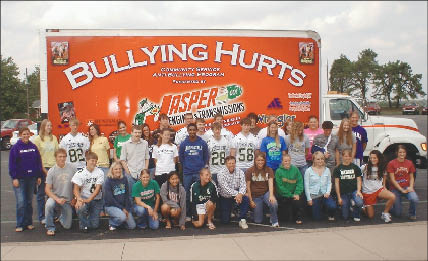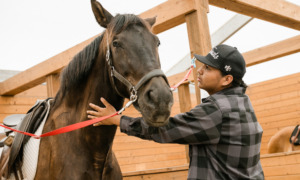Jasper, Ind.
(812) 482-2233
Objective: Reduce teen suicides.
In a Nutshell: The teen wellness centers were put together by the Dubois-Pike-Warrick Economic Opportunity Committee (TRI-CAP) to improve the mental health of adolescents by offering prevention, intervention and follow-up services. Each of Dubois County’s four high schools has an on-site center that provides free and confidential mental health services, including assessments, and basic sick care to any teen whose parents have granted permission. TRI-CAP also trains youths at each of the schools to intervene to help troubled friends.
 |
|
Driving home the message about bullying is part of the wellness centers’ mission. Photo: Photo courtesy of TRI-CAP |
When and Where It Happens: The centers are at high schools in Jasper, Huntingburg, Dubois and Ferdinand, Ind. Youths can make appointments for during or after school.
Who Started It and Who Runs It: TRI-CAP Executive Director Jane Chappell, who was the organization’s director of family health services from 1984 to 2000, started the wellness centers in 1994 in response to five teen suicides in a 14-month period in Dubois County. The program is overseen by Adolescent Services Coordinator Audrey Fleck, with help from social worker Christine Vinson and nurse Carrie Paloro. Fleck and Vinson each visit two centers twice a week, while the nurse visits each center once a week.
Overcoming Obstacles: “Initially, gaining acceptance and support for developing a program to operate in the schools was a huge obstacle,” Fleck says. “Obtaining parent permission was also a challenge.” The formation of an advisory group helped the plan win support, because different representatives from the community had a voice in forming the program.
Information about the program is presented at each school’s orientation night, and permission forms are sent home at the beginning of the year. Last year, parents signed permission forms for 90 percent of the youths.
Cost: About $135,000 a year.
Who Pays: The Indiana State Department of Health is the primary funder, contributing $112,000. The Dubois County Substance Abuse Task Force, Dubois County Community Foundation, and the Kimball Habig Foundation contribute a total of $12,000 annually. Southern Hills Counseling Center accepts referrals from the teen wellness centers and provides emergency assessments to students who TRI-CAP staff members believe are in immediate danger of harming themselves.
Youth Served: All 2,650 youths enrolled at any of the four high schools are eligible. Teens in Dubois County are predominantely white, with a growing Hispanic population, Fleck says.
Last year, the program assessed 811 students, with 66 identified as “at high risk for suicide” and 45 referred to outside mental health agencies.
Youth Turn-On: Because many of the youths work after school, are in after-school activities or do not have driver’s licenses, they appreciate getting access to help at school and during the school day, Fleck says.
Youth Turn-Off: “Some students grumble” when they are asked to complete the initial assessment form, which inquires about touchy subjects, including substance use, family, weight and sexuality. “Some students still feel uncomfortable visiting the clinic,” Fleck adds, “but the stigma of seeking out help is much less than before the program was started.”
Research Shows: Dubois County has gone four years without a teen suicide.
What Still Gets in the Way: “Although there has been a lot of progress, people still do not value mental health treatment as they do physical care,” Fleck says. “This can reduce monetary support for our program, as well as [for] any program that focuses on mental health.”


























